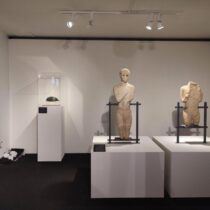The Greek influence played an important and sometimes decisive role in the cultural development of areas along the Mediterranean coast and in the regions further inland. The alphabet, coinage, fine metal work, high-quality pottery and advanced construction techniques all were important innovations which the Greeks either invented or extensively developed before transmitting them to the barbarians of western and northern Europe. Trade and colonization and the resultant intensification of commercial activity as well as various other kinds of contacts greatly contributed to the dissemination of these cultural achievements of the Greeks among the diverse indigenous societies and their essentially Late Iron Age cultures.
The study of the Greek influence in the western and central Balkans started in the nineteenth century by the renowned scholar Sir Arthur J Evans, who later gained everlasting fame due to his excavations in Knossos on the island of Crete. In the 1870s and 1880s he traveled to the present Dalmatia, Montenegro, southern Bosnia, southwestern Serbia and northern FYROM and recorded many of his archaeological observations and discov¬eries in several scientifically valuable books and articles. Even today it does not exist a comprehensive study of the influence Hellenism exercised on the various Illyrian, Thracian and later Celtic tribes who inhabited the western and central Balkans, beyond the northern frontiers of Epirus and Macedonia.


